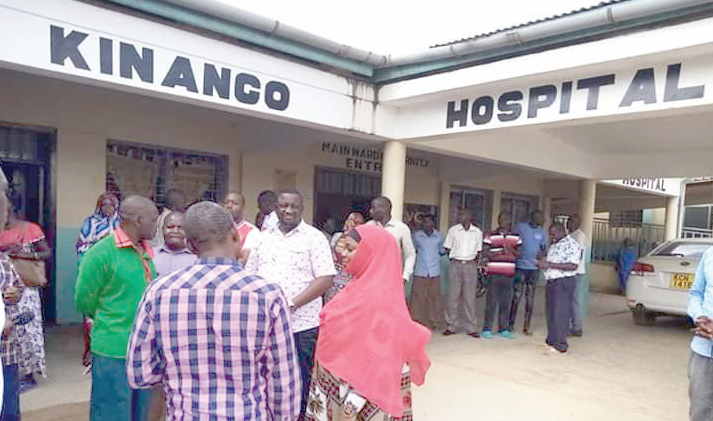Senators alarm over state of hospitals
By Rawlings Otieno, January 3, 2025
Senators have now laid bare how health facilities are ill-equipped, with medical staff and equipment, amid frequent stock-outs of essential commodities across various counties.
The lawmakers are now putting county governors on the spot for the sorry state of most hospitals run by the devolved governments.
In a report tabled in the Senate by the County Public Investments and Special Funds Committee (CPIFC), the lawmakers observed that the medical facilities are also losing revenue running into millions of shillings due to defective or lack of proper billing systems.
This even as it emerged that some of the facilities, mainly Level 4 and 5 hospitals, are grossly underfunded and experience frequent stock-outs of essential commodities like drugs and other supplies.
“Healthcare workers frequently work in facilities that lack essential resources, such as medical supplies and equipment, necessary for delivering quality care,” reads part of the committee’s report.
In addition, the report on considering audit reports for various facilities for 2021-22 also doubts the quality of drugs supplied by the Kenya Medical Supplies Authority (Kemsa).
According to the report, the quality of drugs supplied by Kemsa has also been questioned, with reports of expired or substandard drugs being delivered.
“Kemsa’s drug supply has been associated with poor forecasting, which leads to stock-outs and delays,” the report reads.
For instance, at Migori Level 4 Hospital, the committee established that during the year under review, the facility had an under-funding of Sh32.86 million or 27 per cent of the budget.
The report also observed that the hospital’s Information and Communications Technology (ICT) governance system had critical weaknesses, including partial automation, poor network infrastructure, lack of system integrity and user logs, inadequate billing, unauthorised bill reversals, missing software licences, lack of antivirus, and insufficient physical server controls.
At Karatina sub-county hospital in Nyeri, the Godfrey Osotsi-led committee established that the facility is understaffed and lacks essential equipment for better provision of services. The facility is also not compliant with the requirements of universal healthcare as it does not offer some services expected of a Level 4 hospital, such as an Intensive Care Unit (ICU), High Dependency Unit (HDU), and renal dialysis services.
“The Governor should expedite the completion of infrastructural projects to provide adequate space and facilities for the new services,” the committee recommends.
Further, the hospital did not have a single permanent employee in the ICT department. This placed the sensitive responsibility over the hospital’s hardware and software on casual employees, posing a risk to the security of the system and sensitive data.
In Nyeri, Mt Kenya sub-county hospital, the committee in its report observed that the facility is understaffed with the hospital having 21 registered community health nurses against the required 75 and two medical officers instead of 12.
The Sub County Health facility lacks anesthesiologists, general surgeons, gynaecologists, paediatrics and radiologists. In addition, the Committee observed that the hospital has inadequate operational equipment.
Staff fatigue
At Kinango sub-county Hospital in Kwale, the committee established that the facility has a shortfall of 44 medical staff.
According to the committee, the hospital requires an additional staff of at least 13 medical officers, two anaesthesiologists, a general surgeon, a paediatric, a gynaecologist, a paediatric and a radiologist. “The Committee observed that the hospital was understaffed which adversely affected the current employees who raised concerns on staff fatigue, exhaustion and lack of morale due to overwhelming duties and responsibilities,” the report reads in part.
The governor of Kwale, Fatuma Achani, was directed by the Senate committee to submit a comprehensive plan outlining the specific measures being taken to address the hospital’s staffing shortages within 60 days.
The Godfrey Osotsi-led committee also wants the Ethics and Anti-Corruption Commission (EACC) to investigate the untraceable supplies and possible loss of Sh1.74 million at the Kwale Sub-County Referral Hospital.
The committee established that individuals who were not hospital staff received medical supplies worth Sh1.74 million.
“The Ethics and Anti-Corruption Commission should investigate the untraceable supplies and possible loss of funds amounting to Sh1.74 million and give a status on the same to the committee within 60 days of the adoption of this report,” the committee recommends.
Further, the hospital received drugs worth only Sh550,355 from the Ministry of Health through Kemsa under the UHC programme, which was insufficient to sustain the hospital’s needs.
In addition, the hospital faced stock-outs of essential medical supplies of between eight and 117 days (four months) due to the inconsistency in funds disbursement and the healthcare workers’ contracts had also expired and were yet to be renewed at the time of the audit.
“The Governor of Kwale County should ensure that the health workers have valid contracts in line with the Employment Act,” the report states.
The report further states that the hospital’s monthly service workload report for the financial year 2021-22 indicated a total of 52,533 patients were registered but only 15,106 patients made cash payments amounting to Sh6.02 million.
No receipts
“EACC should investigate the health facility to account for the monetary value of the 12 escaped inpatients and payments made by the 37,427 patients. Those found culpable should be prosecuted by the Office of the Director of Public Prosecution,” the committee recommends.
In addition, the hospital has a shortfall of 101 health workers which the management attributed to budgetary constraints. They also stocked expired drugs valued at millions of shillings.
“The Committee observed that 1,249 units of various drugs of undetermined value expired between August 2021 and June 2022 due to the failure of the stores’ officer to apply the First Expiry, First Out (FEFO) principle when issuing supplies,” the report reads in part.
In Bomet County, Longisa County Referral Hospital, the management failed to account for some Sh19.72 million incurred in the purchase of food and rations.
The expenditure was not supported by receipts in the stores and the facility lacks a register for its assets.
